|
9 Brewhouse Lane
Greenwich
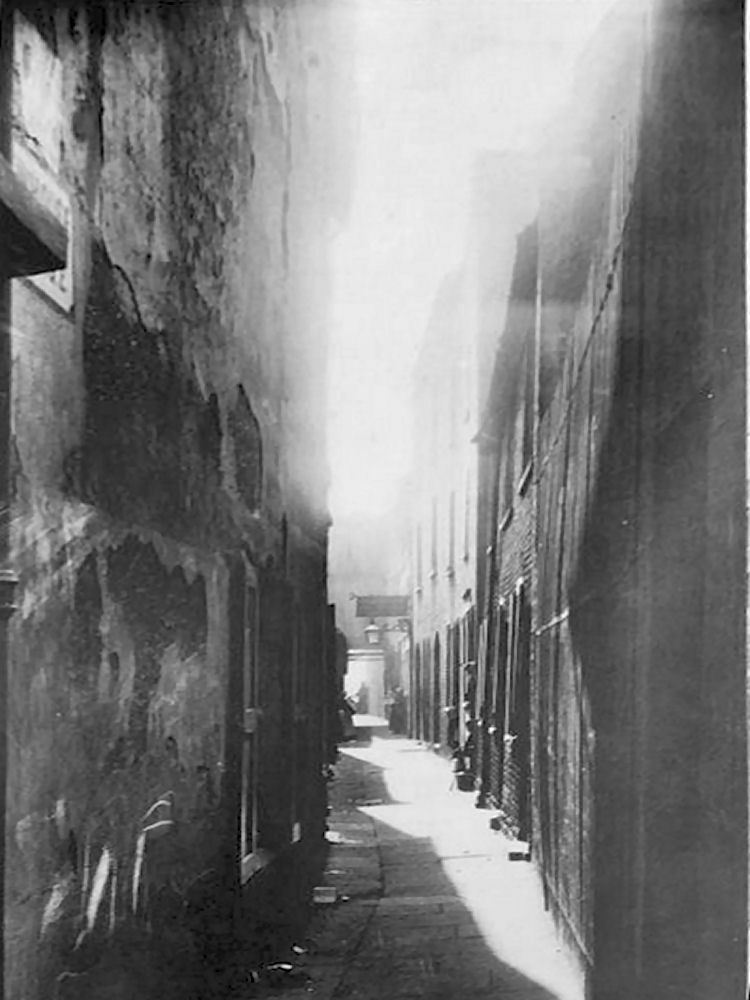
Above photo circa 1900. The view from each end of dirty Brewhouse Lane.
Through the lens of the camera, this alleyway acquires deceptive length.
The sign of Fubbs Yacht is just visible as well as part of Huntley's
overhead railway. |
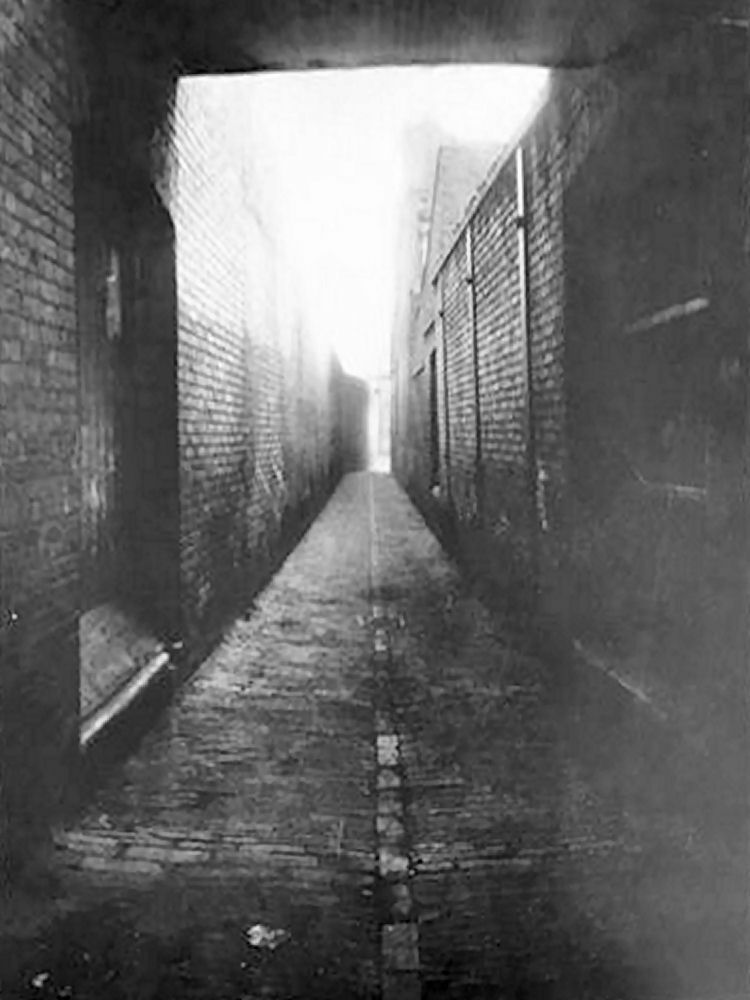
The alley known as Dark Entry, which ran from Brewhouse Lane to
Billingsgate Street past Huntley's Coal Yard, circa 1900. |
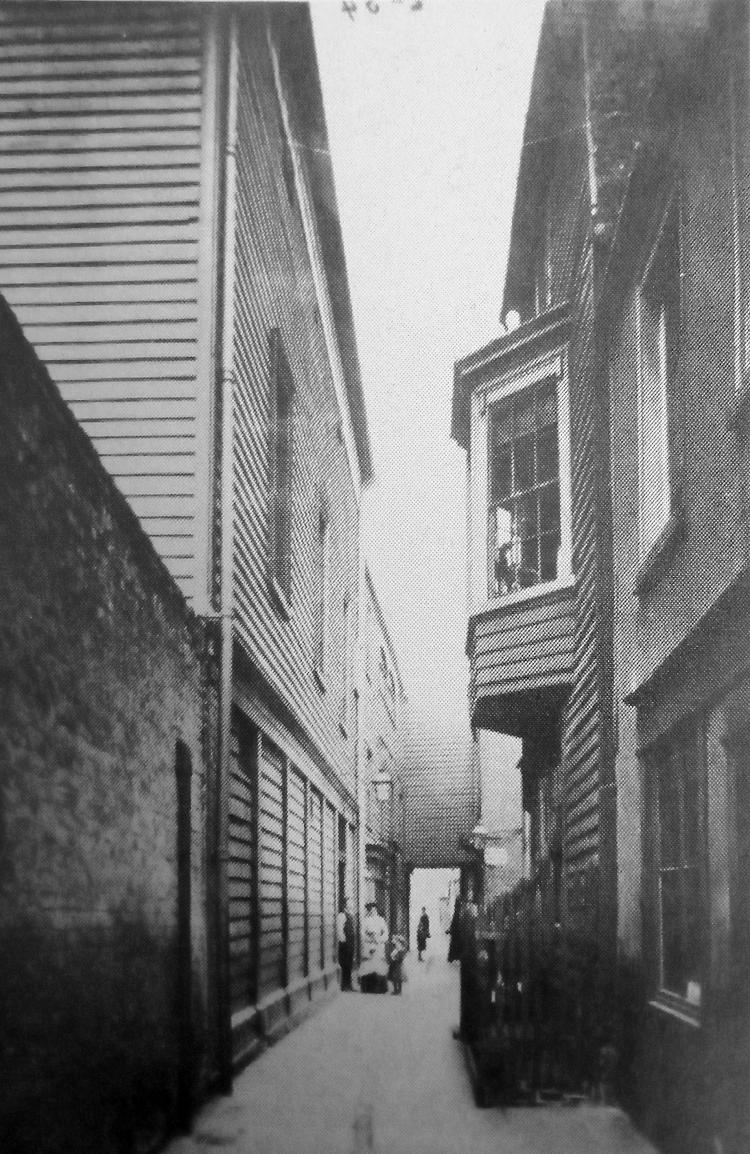
I believe the above photo is of Brewhouse Lane or Turpin Lane 1900. But
not sure if Fubbs Yacht is in view. |
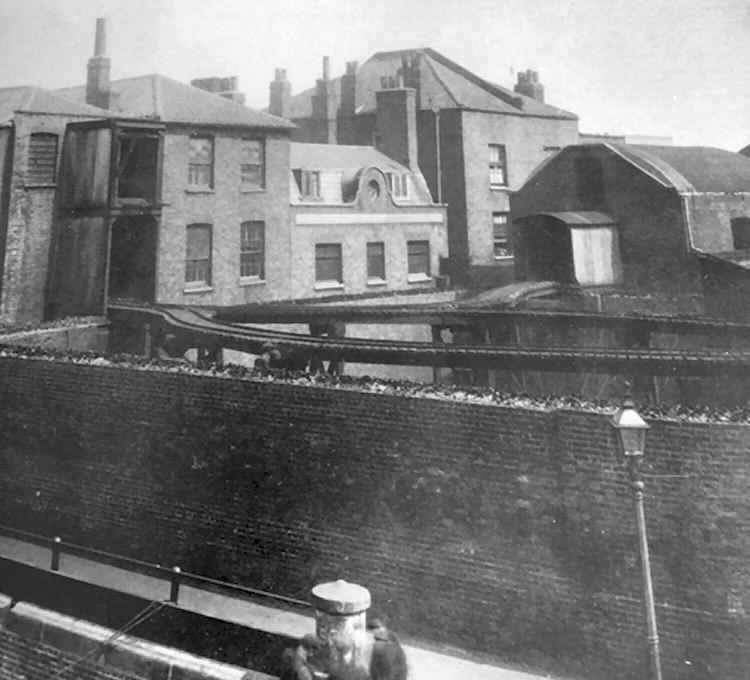
Above photo, circa 1900. Almost whole length of Brewhouse Lane can be
seen here, most of it occupied by Mr. Huntley, whose coal yard with its
railway system and jagged glass-topped wall is prominent. The mansard
roof of the "Fubbs Yacht" adds visual punctuation to an otherwise dismal
street. 'Fubb' meant Trollope or whore in the last century. |
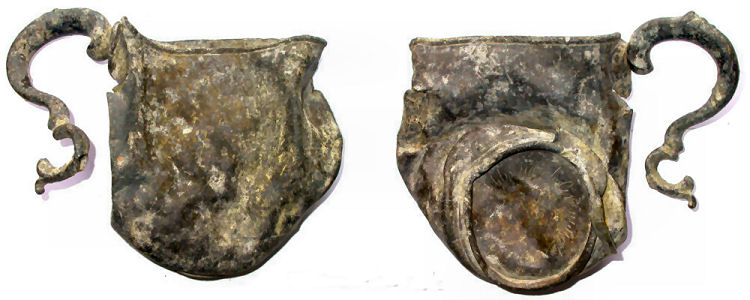
Above photo showing a drinking mug from the pub dated early 1800s. |
Brewhouse Lane ran west off the northern end of Greenwich Church Street,
and has been demolished, circa 1930s.
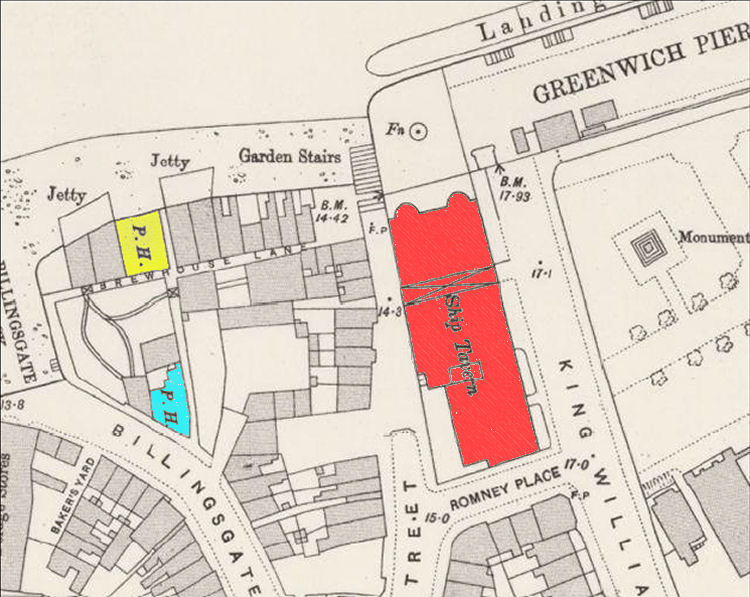
Above map 1893 showing the location of
"Fubb's Yacht."
"Sugar Loaf,"
"Ship Tavern." |

Above drawing circa 1695 showing "10" location of "Peter Boat Tavern"
and "11" "Fubbs Yacht." The "Salutation"
is the building to the left of "11". "Ship
Tavern" to the left of that.
Garden Stairs.
This important landing place has been identified for us by the artist with a
pencil sketch of the stairs and an inn sign added to the building on the
west (10). The stairs had the "Peter Boat Tavern" on the east and the
"Salutation" on the west. The stairs seem to have taken their name from the Skame or Skerne family who owned land in the town in the 16th century. This
landing place was an important access to the town as it stood at the
northern end of Greenwich,
Church Street. It is clear from Samuel Travers’ Survey of 1695 and the
parish rate books that the northern end of Church Street was originally
‘High Street’; the present name was only applied to the southern stretch
near the parish church. Most visitors to the town would have arrived at
either Garden Stairs or Ship Stairs further west.
This part of the drawings shows the riverfront from the stairs, between the
two public houses, the buildings in Brewhouse Lane to the ancient
Billingsgate Dock. When this dock was created is not known but a document of
1449 refers to it. This congested area of alleyways and streets was
photographed by T.L. Brooker in c.1900 when Brewhouse Lane was dominated by
Huntley’s Coal Wharf and "Fubb’s Yacht" pub (11). Running north/south from
Brewhouse Lane was the grimly named ‘Dark Entry’, and, to the south
Billingsgate Street. All have gone presenting us with panoramic views of the
river in both directions - a feature that was not enjoyed at the opening of
the 18th century and indeed not until the creation of Cutty Sark Gardens in
1953. |
|
Information and illustrations from The Keys Family and Brewhouse
Lane, Julian Elphick, academia.edu.
Brewhouse Lane was described in
Charles Booth’s survey for his Maps Descriptive of London Poverty
(1886-1903) as ‘a narrow, paved court. Coal landing stage at the
west end with public house adjoining. Then three-storied houses. ?
in rooms. Windows broken and patched with wood and paper. A low, low
lot. Great puffy women and dirty children’. The court was only about
two metres wide and ran for some seventy-five metres, parallel with
the river, between Garden Stairs, at the northern end of Church
Street, in the east, to Billingsgate Dock in the west. The eastern
end was cleared in the 1890s and the glazed dome over the entrance
shaft of the Greenwich foot tunnel under the river to the Isle of
Dogs now stands on the site. The western end was cleared in the
1930s, the area becoming Dodd’s Wharf. The whole area now forms part
of Cutty Sark Gardens.
Now we must consider the court’s name; it is reasonable to assume
that a brewhouse once stood there. I have found no evidence of such
a brewhouse existing in the area in the eighteenth or nineteenth
centuries. However, records of the Manor of East Greenwich in 1695
record that ‘Capt. Barrett holdeth one tenement (a brewhouse) with
the appurtenances, having the River of Thames north, the widow
Crispe’s lands south and east, Billingsgate Dock west…’ for which he
was paying an annual rent of one shilling (5p). Further, John Wooten
was paying tuppence per annum (1p) for ‘one tenement, having the
lands of Capt, Warner’s heirs east, the lands of Capt. Barrett,
being the Brewhouse, west, Brewhouse Lane south, and the River of
Thames north…’.
Bearing in mind the brewhouse’s proximity to the river and its
bustling trade, it is probably safe to assume that Captain Barrett
was a mariner, rather than a military gentleman, and that the output
of his brewhouse went to the victualling of ships, a trade which was
taken by the rise of the common brewers in the eighteenth century.
However, it is not difficult to imagine that some of Barratt’s beer
went down the throats of thirsty boatmen. Perhaps, and this is pure
speculation on my part, the brewhouse may have been the genesis of
the pub in Brewhouse Lane, the Fubbs Yacht? The original pub, of
wooden construction like the surrounding houses, was burnt down in a
large fire in 1847, was rebuilt in brick and traded until about the
time of the Great War.
The pub’s odd name is derived from His Majesty’s Yacht Fubbs,
which was built at Greenwich in 1682. Fubbs was Charles II’s pet
name for one of his mistresses, Louise de Kérouaille, and it was a
term popular at the time, meaning plump or chubby. The ketch-rigged
vessel had a long career, was rebuilt and modified a number of times
and was withdrawn from service and broken up in July 1781. |
|
Caledonian Mercury 08 September 1748.
(Fubbs Yacht was named after a Yacht of that name, as in this news
report.)
Yesterday the baggage of his Royal Highness of Cumberland, was put on
Board the "Fubbs Yacht" at Greenwich, which is to sail with all
Expedition for Harwich.
And tomorrow 'tis expected his Royal Highness will set out from St.
James's for Harwich, in order to embark on Board the said Yacht for
Holland.
|
|
Kentish Independent 10 January 1846.
BURGLARY.
William Ward, of Thames-street, Greenwich, mason, and James Barrett, a
potter, having no home, were charged with burglariously breaking into
the house of Mr. Joseph Cole the "Fubbs Yacht," Thames-street, Greenwich,
and stealing therefrom a coat, bilk handkerchief, a shawl, a cap, and
5s. 6d. in cash.
Mr. Cole deposed that he cleared his house on Sunday night. The
prisoners remained until the last minute, when he was compelled, in
order to get rid of them, to put out the gas-light and extinguish the
fire. Witness then went to bed. He came down stairs on Monday morning
about a quarter past seven, when he found the bar-door open, the sash
window drawn up, and the parlour shutters half open, and a square of
glass broken. This enabled the robbers to remove the box which held the
bolt and get in.
Sergeant Lovell, 15 R, deposed that on being sent for, he found the
window, &c., as described by the last witness. From information
received, he apprehended Ward, who said that he slept at the "Bell Inn,"
Aldgate, the previous night, and that on leaving the next morning, his
uncle, at the "Bell," gave him five shillings. The prisoner had bought a
new shirt and handkerchief in Bishopsgate-street, although the previous
day be was pennyless. Ward had since confessed that his story of going
to the "Bell" was untrue, that he had robbed the house in connection with
Barrett, who had taken the coat and sold it to a Jew in London for ten
shillings, and further, that he (prisoner) held the light while Barrett
effected the robbery.
Police-sergeant Roscoe said that be apprehended Barrett in bed at a
public-house in East Greenwich, who declared his innocence.
John Brennan, of the "Waterman's Arms," remembered the prisoners coming to
his house on Sunday, when they appeared to have no money. On Monday, at
11 o'clock forenoon, they came again and had some beef steaks cooked for
dinner. He furnished some ale. They paid and went away.
Mr. Jeremy here said, that it would be necessary to remand them for a
week, in order that strict inquiries might be made by the police as to
the missing property. The prisoners were accordingly remanded to
Maidstone gaol for a week.
|
|
From The Morning Post, Thursday, 8 July, 1847.
THUNDER-STORM.
DREADFUL AND EXTENSIVE FIRE CAUSED BY THE LIGHTNING.
A terrific thunder-storm broke over the metropolis yesterday morning,
passing from S.W. to N.E. It commenced about half-past twelve, and
lasted until after two.
During the raging of this storm the electric fluid struck the roofing of
the private dwelling in the occupation of Mr. Wiseman, Brewer's lane,
Greenwich, near to the Hospital, and close by the Watermen’s Pier, at
the bottom of Church-street, and set fire to several other dwellings.
It appears that-one of the neighbours, being alarmed by the thunder,
went to one of her windows to throw it open, when a stream of fire shot
from the clouds and at once illuminated the hemisphere, striking it
immediately over the roofing of the premises in Mr. Wiseman's occupation; in a short time she
saw the roof on fire, and aroused her neighbours. Scores of poor people,
who inhabit this densely crowded thoroughfare, jumped from their beds,
and rushed from their dwellings almost in a state of nudity, and some
narrow escapes from injury were experienced, the fire travelling with
great rapidity from the fact that the cottages were chiefly constructed
of timber.
Several engines soon arrived, and the hose on the float being led from
the Thames, and the engines well supplied, vast bodies of water were
soon poured upon the burning materials, but the fire proposed from house
to house, until it encircled an area of great extent, from Mr. Wiseman’s
private dwelling it extended to the lofts and storerooms of Messrs. W.
and K. Huntley, sail-makers, thence to the warehouses of the same firm,
and the private residence of one of the partners. Several cottages on
the same side of the way then became ignited, while those on the
opposite side, in Coombe’s-court, caught fire. The excitement then
became extreme. The poor people were compelled to stand by and see their
little all of furniture and effects destroyed, all their efforts to save
it being cut off by the fury of the flames. The efforts of the firemen
were directed for some time to removing some wooden partitions, that
they might if possible save the ancient water-side house, the "Fubbs’s
Yacht," but their exertion proved fruitless—the whole of the building
and its contents are destroyed. At this critical juncture much judgment
was displayed by the directors of the firemen, the water being copiously
distributed from points commanding the seat of the fire, while other men
were stationed with their branches so as to keep cool the reeking walls
of the adjacent buildings. By seven o’clock the fire was so far subdued
that no farther danger of its extension appeared, and by nine o’clock
nothing remained but a smouldering mass of ruins.
Subjoined is the official report:— "July 7, 1847. Fire upon the premises
undermentioned, situated severally in Brewer’s lane and Coombe’s-court,
near the Hospital, Greenwich. Broke out upon the premises in the
occupation of Mr. T. Wiseman (private); burnt down—not at present known
if insured. Premises of Messrs. W. and R. Huntley, mast, block, and
sail-makers; building and contents burned down—insurance unknown.
Private house and warehouse belonging to the same firm; roof off, and
stock and furniture seriously damaged—not known if insured. Mr. James
Finch, Brewer’s-lane (private); all but destroyed—supposed to be insured
in the Sun Fire-office. House of Mr. T. Cole, licensed victualler, sign
"Fubbs’s Yacht;" burned down—contents insured in the Phoenix, building
unknown. Mrs. Truscott (private); burned down—not insured. Coombe's
court.—Mr. S. Welsh (private); burned down—uninsured. Mr. Burns
(private); burned down—uninsured. Mrs. Taylor (private); front damaged,
walls partially pulled down—not insured. Mr. Lant (private); similarly
injured. Three houses on the opposite side, occupied severally by Mr.
Blackman, Mr. Giles, and Mr. Matthews, are also destroyed—cause,
electric fluid. Happily, no one was injured."
LATEST PARTICULARS.
Yesterday afternoon Mr. Braidwood, the superintendent of the London Fire
Establishment, proceeded to the scene of conflagration, for the purpose
of ascertaining whether or not the calamity was occasioned by
electricity. The result of that officer’s investigation. leaves no doubt
that the fire was caused by lightning. Two persons, who lived in
Brewer's lane, positively asserted that they saw the buildings struck.
Mrs. Giles, whose house and furniture have been reduced to ashes, stated
that about ten minutes before two o’clock she was awoke from her
slumbers by a peal of thunder resembling the discharge of a piece of
ordnance against her house. Imagining that the house was falling, she
immediately got out of bed, and pulling the blind on one side, she
looked out of window, when she saw a streak of lightning shoot in an
oblique direction, and strike the sail loft of Mr. Huntley. It had no
sooner done so than smoke and flames shot forth, in the first instance
in small bodies. She, seeing what was likely to take place, apprised her
family, and by the time they could get dressed the principal portion of
Mr. Huntley’s property was enveloped in one broad sheet of flame.
It is the general opinion that several parts of the same building were
fired simultaneously. This is borne out by a man named Smith, a
shoemaker. He stated that he had got up and gone into the Court, when he
saw a stream of lightning shoot in a “zig zag” form through the alley,
as if its progress was impeded by the walls of the houses, and as soon
as it touched the arch that crossed the lane, and which connected Mr.
Huntley's stores, it made a whizzing noise like the discharge of a
squib, and in less than a minute afterwards the fire was distinctly
visible in several places. At the time of the outbreak there were an
immense quantity of blocks, spars, tar, ropes, and canvass, and other
equally inflammable articles in the premises which will account for the
rapid progress of the conflagration. Shortly after the premises
belonging to Mr. Huntley became fired the side walls bulged out, and
then the flames extended right and left almost with the swiftness of
that element which had caused the mischief. Mr Huntley, sen., who had
been confined to his bed by illness, was unable to escape to avoid his
being burned to death; a man named Blackmore carried him on his back to
his son’s private residence. Had it not been for the services of the
floating engine, there is no doubt that the "Salutation Tavern" and the
Watermen’s Steam Packet Office would also have been laid in ruins. Since
Mr. Braid wood’s official report was made out yesterday morning, it has
been ascertained that the mast and sail-making premises of Mr. Huntley
were insured in the Sun and Phoenix Fire-offices. The salt warehouses of
Mr. W. Huntley were insured in the Sun. Mrs. Finch, whose premises were
nearly destroyed, was insured in the same office. Mr Cole, the
proprietor of the "Fubbs’s Yacht" public-house, was insured in the
Phoenix. Mrs. Truscott, Mr. S. Welsh, Mr Burns, Mr. Taylor, Mr.
Blackman, Mr Giles, and Mr. Matthews, were not insured for a single
penny. The latter were poor hard-working people, and having been
deprived of house and furniture, there is do doubt that a subscription
will be opened for them. At five o’clock last evening a great deal of
fire remained beneath the ruins, and a couple of engines with several
firemen were obliged to be kept on the spot in case of a fresh outbreak.
At present it is impossible to tell with precision the amount of the
losses, but from the fact of several of the buildings having been
substantial brick erections, the damage must of necessity be very
considerable.
|
|
From the Borough of Greenwich Free Press, 4 September, 1858.
Suspension of Licenses.
At the licensing day, on Thursday last, the following licenses were
suspended:—
Mr. Knowles, "Prince of Wales," London-street:
Mr. Griffiths, "Fubbs Yacht," Billingsgate-dock;
Mr. Ballinger, "Yorkshire Grey," Blackheath-hill, Greenwich.
|
|
Coventry Evening Telegraph 16 February 1914.
CURIOUS INN SIGNS.
In a return of the licenses of public-houses which are in the course of
extinction, issued by the London County, occur many peculiar names,
including the "Freetrader" from Woolwich and "Fubbs Yacht," Greenwich.
|
I am informed by Graham McDougal that his maternal grand-father, William
Hughes was living there in 1914 when he signed his attestation papers for
WW1, although it is unknown where he was the licensee. His family were still
living in the building till at least 1915, so the building was still there
in that year, but had moved to Eltham by 1917.
LICENSEE LIST
CRUMP Joseph 1832+

COLE Joseph 1840-Feb/48 (age 45 in 1841 ) )
NORRIS James Feb/1848-Nov/49
BATCH William Nov/1849-52+
GRIFFITHS Edward William 1858-62+
KEMP John Manwaring to Jan/1863
PHILLIPS Benjamin Richard Jan/1863-67+
GRABHAM/GRAYHAM William 1871-74+ (age 59 in 1871 ) )
MORRIS William J 1881-82+ (age 49 in 1881 ) )
MORRIS Amelia to Nov/1890

HARRISON William Thomas Mayne Nov/1890+ (age 28 in 1891 ) )

SORRELL Thomas 1896+
WORMLEY Arthur J 1901+
WINSON George W 1904-08+
PRING William 1911+
https://pubwiki.co.uk/FubbsYacht.shtml
http://www.closedpubs.co.uk/fubbsyacht.html
 From the Pigot's Directory 1832-33-34 From the Pigot's Directory 1832-33-34
 Census Census
 Woolwich Gazette Woolwich Gazette
|






